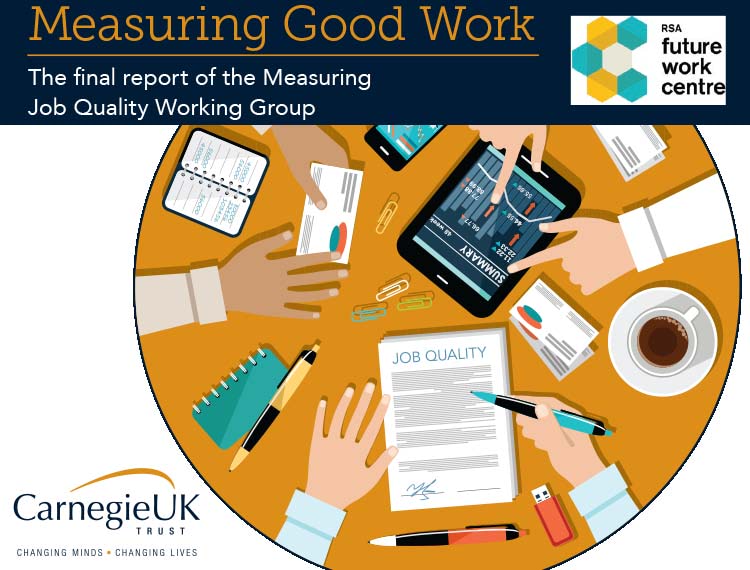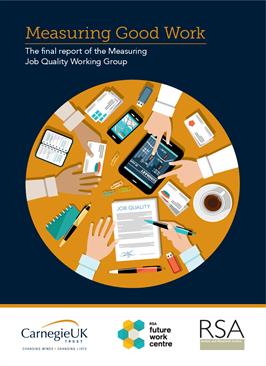MEASURING GOOD WORK

In 2017, the Taylor Review of Modern Working Practices called on the government to pay closer attention to the quality of work in the UK, alongside its quantity. To aid these efforts, the Review recommended that a new set of metrics be created – ones that could paint a richer picture of the modern world of work, beyond the numbers of people in and out of work and average pay levels.
 The RSA and Carnegie UK acted on this recommendation by establishing the Measuring Job Quality Working Group. Chaired by Matthew Taylor and Martyn Evans, this Group brought together academic experts, unions, employers and others to debate what it would take to create a new set of metrics. What determines job quality? What can be accurately and meaningfully measured? How can we measure what matters in a way that is affordable?
The RSA and Carnegie UK acted on this recommendation by establishing the Measuring Job Quality Working Group. Chaired by Matthew Taylor and Martyn Evans, this Group brought together academic experts, unions, employers and others to debate what it would take to create a new set of metrics. What determines job quality? What can be accurately and meaningfully measured? How can we measure what matters in a way that is affordable?
DOWNLOAD REPORT
The recommendations in the report detail the findings of the Measuring Job Quality Working Group co-chaired by Matthew Taylor and Martyn Evans of the Carnegie Trust. Set up in 2017, the Group put forward job quality measures – relating to the terms of employment, pay & benefits, health, safety & wellbeing, job design & nature of work, social support & cohesion, and work life balance.
Following a review of more than 100 questions asked in existing surveys and a process of deliberation and prioritisation, the Group agreed 18 priority measures of job quality. Among them are satisfaction with pay, the minimum number of guaranteed hours, mental health, opportunities for progression, relationships with line managers, and employee involvement in decision making.
The Group concluded, however, that due to difficulties in collating data in these areas, a cross-UK survey was the only viable way to generate this information and instead suggested job quality metrics should be added to the Labour Force Survey (LFS). The LFS already contains six of the measures proposed by the Working Group, and the cost of adding the additional 12 measures would amount to £200,000 per year. We believe this represents a reasonable cost and excellent value for money.
Although it might appear a rather technocratic issue, measurement matters. It is only by tracking people’s experiences of work that we can understand whether our ambition of ‘good work for all’ is being achieved. Measurement allows governments, business and civil society to explore why different trends are occurring and to identify policy and practice interventions to deliver change where required.
The Association of Professional Staffing Companies APSCo has welcomed Friday’s publication of the ‘Measuring Good Work’ report compiled by the RSA and Carnegie Trust, which focuses on the recommendation in the Taylor Review that ‘the Government must place equal importance on the quality of work as it does on the quantity’.
Samantha Hurley, Operations Director at APSCo commented:
“We welcome the ‘Measuring Good Work’ report’s recommendations which encourage action to better understand the make-up of the UK jobs market in terms of quality of work, not just quantity. We will continue to work closely with the Department for Business, Energy & Industrial Strategy (BEIS) – as we have done for many years on issues impacting the professional jobs market , and we would be happy to urge our members to complete such a survey.”












Responses